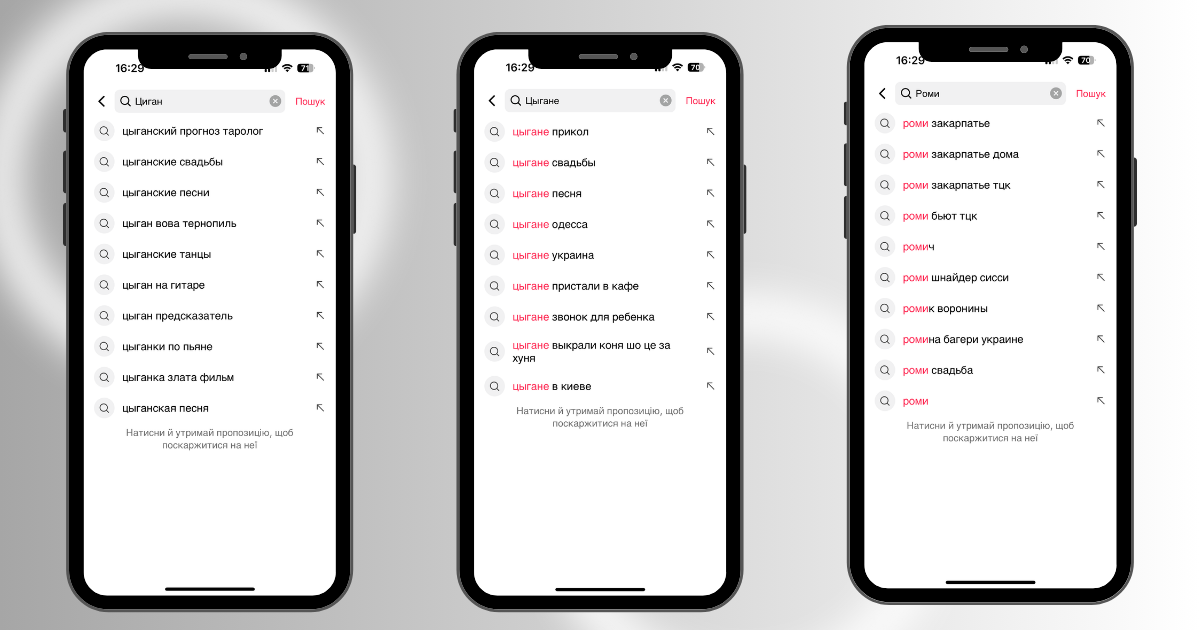Racism and bullying in TikTok: how Romanis are depicted in this social network
We have already addressed this matter earlier. But this popular social network with its video content delivers an inexhaustible supply of bullying, abuse and stigmatisation of both individuals and ethnic groups.
Is it worth to talk about comments below a video of a girl that dares talk about body positive approach? How about the «insufficient domesticity» which TikTok regards to be one of mortal sins. And then there are toxic advice on relationship, pick up life hacks from the previous century, the devaluation, the pseudo-psychologists. All of the above are but a tiny part of the trash content on TikTok.
And then, of course, there is the anty-Gypsyism on this network. It appears that there will be enough unacceptable content to discuss in another article. Take, for instance, the search suggestions. Firstly, users search for «Gypsies», an unacceptable term in both Ukrainian and Russian. We have reiterated that this ethnic group’s name is Roma or Romanis. And that is the only name that should be used. Calling them Gypsies is the same as calling Ukrainians «khokhly». It is denigrating, devaluating, downright lowly. Have you noticed that this is the term used by imperialists? They only have khokhly, zhydy, tsygany… They use names of diseases (debil, daun, degenerat etc) to offend other people. I am now listing all the analogues so that the word tsygany eventually vanish from Ukrainian vocabulary.
Let us move to the next question. What is it out of the life of Romanis that is of interest to certain people—particularly TikTok users? Let me quote: «a Gypsy Taro forecast», «Gypsy weddings», «a Gypsy fortuneteller»… And then there are songs, dances, guitars… And all of that is filled with stereotypes and bias.
The situation is not much better if u use Roma or Romanis as a search keyword. Here we have the following results: «Romanis beating TTsK (military recruiters», «Roma Transcarpathia at home»…
 Let me tell you that my TikTok is set to Ukrainian language. However, all of the popular requests are somehow offered in Russian.
Let me tell you that my TikTok is set to Ukrainian language. However, all of the popular requests are somehow offered in Russian.
How about the users themselves? What do they publish? As usual: the «jolly jokes», built upon false ideas about the Romani community.
Episode One: The Influencers
A boy and a girl enter a car dealership with a lot of branded bags. They then start making photos before an expensive car. One may well say that these are influencers «producing content». The administrator lady then tries to banish them from the dealership. The video is subtitled as follows: «When info-Gypsies have once again paid us a visit».
Of course, we know who and what do they mean. The ostentatious life on social networks which in no way is a reflection of reality. Why info-Gypsies though? Why not info-swindlers? Why not info-show-offs? Do we really have so few slang words that would describe this kind of behaviour?
Overall, the notion of «info-Gypsy-ness» has so far become well-instilled. It is used to denote dishonest behaviour—when people are making money out of thin air, promising that, once one buys their course, training, guide, you are going to encounter «successful success». However, let me repeat: is that not swindlership? Is that not manipulation? Why does one have to take certain negative features of certain people and link them to an ethnicity? That would be a rhetorical question…

Episode Two: A Family
Presented is a married couple in a dwelling. The husband is searching for something in a wardrobe. The wife is also rustling through open drawers. Subtitled text: «Waiting for my husband to find his favourite underpants which the Gypsy living next to the rubbish bin outside our house has been wearing for the past two days». (spelling as is, – author)

Funny? Yes, it is. Handling the personal space of another person, even if that person is your own husband, is something about respect, is it not?
But who falls into the category of homeless people in Ukraine? Are those only Romanis? Which criteria has madam humorist used to determine that it was precisely a Romani guy that was living next to the rubbish bin outside her house? Does the word «Gypsy» used here automatically make the joke funnier? I personally am disgusted by «sketches» like this one. And please do not tell me that I do not have a sense of humour. Or maybe you can tell me that. The main thing is that I have respect towards my partner and towards the people close to me.
Episode Three. My «favourite» one
This lightweight entertaining video contains literally everything: upbringing of children, rejuvenation, development. The video uses the word «Romani». Utter positivity, is it not? Not exactly. All of the above is packaged with a stereotype. Take a look at the screenshot. We are deliberately publishing a single fragment, as the entire text is utter thrash.

What do we have then? Parents are offered to give their shy disobedient children with a bad appetite (munchkins, so to say) to a Romani children’s camp, «Baro Gudlo». This, incidentally, means ‘great sweetness’ or ‘great joy’ in the Romani language. Were the authors sarcastic here, too? Or were they just unable to translate the words properly?
Next go some pretty obvious hints. Living in the in the open—that is something about the Romani nomadic life. Developing communicative skills—that is something about panhandling and fortunetelling. Bettering of one’s appetite and non-pickiness when it comes to food—that is something about bad food consumed by the community.
Firstly, would any loving parent give their little sunshine to people so asocial?
Secondly, I am once again finding out that I have no sense of humour.
Thirdly, this is once again a stereotype. For many decades already, Romanis have been sedentary. They have usual jobs as teachers, physicians, military men and women, attorneys… The Romani cuisine is similar to the Ukrainian one. Some individual marginalised persons are into panhandling. You can find such persons among Ukrainians or other ethnicities, too.
Let us send some generic kids to a camp named «Kalyna and Salo». Why not? Let us teach them to sing, make moonshine, pub crawling with a mate… Aren’t Ukrainians like that? Who, then, has decided that Romanis are like that?
Here is a carpet recommendation. Once you have a wish to «joke» about a certain ethnic group, try joking about yourselves first. Is it as funny then? Next, try sharing your jokes with the public.
Episode Four. An Expert One
We see a dark-skinned girl replying to a comment: «She is some kind of a Gypsy… What is the number of this maternity hospital? Where is it located? Asking so that I never get anywhere near…»
This woman is a physician. She is telling us about obstetrics and gynaecology. She is sharing her experience. She is giving us advice. How do people comment? About her appearance. And about her being part of the Romani group. Is origin really the most important thing for a specialist?

But here, the commentators have mistaken. The physician is in fact of another ethnic origin. What should one do now? Can one have an appointment? Or are all dark-skinned and dark-haired people untrustworthy?
Did you know, by the way, that the first Romanis killed by the Nazis were light-haired Romanis with light eyed (yes, such Romanis exist, too). And here is another reminder for such commentators: it were the Nazis who attempted to create a racial classification by features of appearance. The size of a nose, the shape of one’s eye, the tincture of one’s skin… So have the commentators absorbed the «best practices» of Nazism?
And another thing, the icing on the cake. Or, rather, the cake itself. That would be Episode Five
As can one derive from this video, the parents are congratulating their child on the occasion of the child’s 21st birthday, presenting the child with a funny cake. On top of the cake, there is a lame horse and a lame text: «Today is the 21st anniversary since we bought you from the Gypsies».

Back to the classic stuff we are: I have no sense of humour. Yes, I am a buzzkill and I admit that. But how about these words? This is a humiliation of the Romanis. This is also a humiliation of one’s own child. Who would say anything like that if your child has been adopted? Is that like an expression of your immeasurable love: like, we have salvaged you by giving you a better life? In this case, here is the next question. How about the infringement of law by the parents? Human trafficking is an extremely severe crime in Ukraine. So how could they have bought a child?
But even that is not the point… Those are just jokes. Nonintrusive, lightweight, careless jokes. Perhaps the authors just do not notice the problem behind all this. They should, however, realise that such «humour» is shaping and fortifying stereotypes. They create an image of a Romani who is a panhandler, a vagabond, one who does not fit into a «normal» society. The reality, though, is completely different. No one, however, has tried to see the truth and no one wants to see the truth. Because it is way more simple to just live and cultivate stereotypes. After all, such plain and vulgar «humour» works well with the audience.
In the same manner, stereotypes exist in other areas. Jokes about blondes, women drivers, buddies/mates, however, gradually fade away from the mainstream. So let us believe that lame jokes about the Romanis will also eventually fade away.
See also
- «Невидимі. Стійкість: минуле і сучасність ромів». Як зрозуміти історію ромів через візуальну культу
- Альфреда Марковська: історія життя і порятунку інших
- «Дивись і не забувай»: 15 років Dikh He Na Bister у Кракові
- ФОТОРЕПОРТАЖ: У Києві відкрили виставку про ромську історію та ідентичність
- «Відновлення пам'яті – роми у Варшавському гетто». Історична екскурсія у Варшаві
- PHOTO REPORT: Events commemorating the victims of the Roma genocide in Babyn Yar
- 2 серпня — Міжнародний день памʼяті жертв геноциду ромів
- Коли допомога — це більше, ніж ваучер
- Антициганізм поруч: як розпізнати упередження у звичних словах і жартах
- Стереотип замість культури: як TikTok спрощує ромську ідентичність